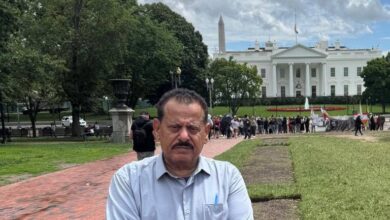Castrating Minds

Yemeni mp
Ahmed Saif Hashed
I still remember the scene of them castrating the Eid ram. I watched in horror as they descended upon it with all their strength and weight. They grabbed its four legs, head, and rear, laying it on the ground and spreading its legs apart while it kicked and struggled in vain.
They placed a smooth, hard stone near its thighs, laid its testicles upon it, and began to strike them with a hammer. The ram suffered and resisted, but to no avail, under the relentless force descending upon it like fate. When they had completed their task, they released it after having destroyed its masculinity with the iron hammer.
I was engulfed in shock, unable to comprehend what they were doing. They had not told me anything beforehand about their intentions or what they were about to do. I was bewildered as to why they were striking its testicles. What had those testicles done to deserve such treatment? I was the only one present who felt the pangs of the moment and shared in the pain of the victim.
I was the only one lost in astonishment at what was happening. The only one grappling with questions while others paid me no mind, ignoring me completely. I had no power to prevent their brutal acts.
My curiosity, which had long been confined within me, could not object but did manage to ask my mother after everything had ended: “What did you do, and why?” Her answer was, “So it can grow quickly, and its meat can be good for Eid.” However, her answer did not satisfy my yearning. What did its testicles have to do with what she claimed? When I grew older, I read about the castration of singers to enhance their voices.
* * *
As I grew up, I encountered even stranger and more astonishing stories. I came across a legal opinion stating that artists should be castrated to prevent them from tempting women.
It was said that Caliph Abdulmalik ibn Marwan, due to his concubine pouring water away from his hands to listen to the voice of a distant singer, ordered his castration out of concern for Muslim women. Similarly, Caliph Suleiman ibn Abdulmalik, while on an outing, ordered the castration of a singer upon hearing his melodious voice, believing he posed a danger to the chastity of Muslim women.
Even more remarkable was what the historian Al-Asfahani recounted: a fly led to the castration of singers in the city when one of the Umayyad caliphs ordered the governor of the city to “castrate” the singers.
The governor mistakenly saw a dot on the letter “h” left by a fly, causing the word to transform from (castration) to (counting), prompting him to command that they all be castrated. Among those castrated was “Al-Dalal,” one of the most famous and charming singers of the city.”
Castration was also practiced on slaves working in the palaces of sultans and the homes of women to prevent sexual relations with them. They also castrated children and boys of enemies who were enslaved, aiming to cut off their lineage and curb any sexual urges.
* * *
During the era of the Imams in Yemen, particularly under Imam Yahya Hamid al-Din, I read in “The Hostage” by Zaid Mutai Dhamaj that their method for subjugating tribes and ensuring loyalty involved a system of hostages. The Imam would take the sons of tribal leaders as hostages, and those who attempted to escape were captured and shackled in the Cairo fortress for life.
Boys among the hostages, who had not yet reached puberty, were chosen to serve the Imam’s harem and his elite. When they reached puberty, they were either returned to the fortress or castrated if they were assigned to palace service to prevent any immoral acts. They were called “Duwidar,” acting as the castrated servants.
Zaid Mutai Dhamaj narrates in “The Hostage” that those who performed the duties of “Duwidar” and returned to the Cairo fortress had strange and astonishing tales. He noted that most of the returnees had changed significantly, their faces pale and their bodies unusually soft, with signs of flabbiness and premature decay. He also observed the guards’ interest in these soft-skinned, high-pitched boys, dressed in clean garments trailing to the ground, and “kawafi” adorned by palace women to conceal their styled hair, from which wafted the scent of fragrant oils that the guards inhaled with delight.
They maintained their women’s purity by forcibly castrating these boys, treating their own deficiencies with a greater deficiency. They were burdened with permanent injuries and disabilities. At this point, one could invoke the popular saying: “You want a fault or a donkey.”
* * *
Today, things have become worse and more painful than yesterday. We now witness a broader and more horrific form of castration, where minds, voices, pens, and actions are all subdued. This is a more severe and painful form of mutilation!
I have come to understand how power practices the castration of men and robs them of a future we have long aspired to. I have seen how men are transformed from equals and exceptional individuals into mere bearers of incense—subservient followers stripped of will and action, powerless and helpless. I have learned how authority and wealth exert their influence over many intellectuals, holders of advanced degrees, and academics, turning men into trumpets lacking will, stance, or conscience.
I have recognized the emptiness of the intellectual and the media figure who distorts awareness, following politicians like a rope or a sheep led to slaughter without resistance. I have encountered many who have been castrated and have certainly recognized the ugliness of power that practices castration and treachery.
I have understood the fragility of the intellectual who sells his conscience at the first offer. This fragility collapses at the first blow of a hammer on the head or the testicles.
An intellectual who has become a follower, revolving in the orbit of his idol, losing his conscience and existence. I have seen followers devoid of reason, principle, or values, and men devoid of masculinity, virility, or existence.
In contrast, I have also encountered remarkable individuals, towering like palm trees and steadfast as the mountains.
They are free spirits who prefer sacrifice over surrender, resistance over submission, and courage over fear.
Their ever-alert and troubled conscience does not sell out or compromise, even when offered the riches of the earth and the heavens, along with promises of the afterlife. No earthly hell could force them into submission to tyrants, oppressors, or usurpers of power.
* * *






